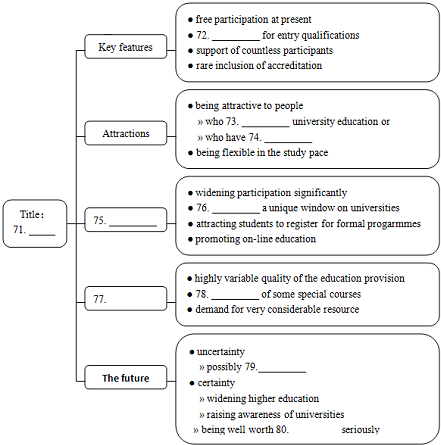题目内容
17.There were smiling children all the way.Clearly they knew at what time the train passed their homes and they made it their business to stand along the railway,were to complete strangers and cheer them up as they rushed towards Penage.Often whole families stood outside their homes and waved and smiled as if those on the trains were their favorite relatives.This is the simple village people of Malaysia.I was moved.I had always traveled to Malaysia by plane or car,so this was the first time I was on a train.I did not particularlf relish the long train joumey and had brought along a dozen magazines to read and reread.I looked about the train.There was not one familiar I sighed and sat down to read my Economics
It was not long before the train was across the Causeway and in Malaysia.Johore Baru was just another city like Singapore,so I was tired of looking at the crowds of people as they hurried past.As we went beyond the city,I watched the straight rows of rubber trees and miles and miles of green.Then the first village came into sight.Immediately I came alive,I decided to wave back.
From then on my joumey became imeresting.I threw my magazine into the waste basket and decided to join in Malaysian life.Then everything came alive.The mountains seemed to speak to me.Even the trees were smiling.I stared t everything as if I was looking at it for the first time.
The day passed fast and I even forgot to have my lunch until I felt hungry.I looked at my watch and was surprised that it was 3:00 pm.Soon the train pulled up at Butterworth I looked at the people all around me.They all looked beautiful.When my uncle arrive with,I threw my around him to give him a warm hug.I had never done this before.He seemed surprised and then his weather-beaten face warmed up with a huge smile.We walked arm in arm to his car.
I looked forward to the return journey.
66.The author expected the train trip to beD.
A.adventurous
B.pleasnt
C.exciting
D.dull
67.What did the author remember most fondly of her train trip?A
A.The friendly country people.
B.The mountains along the way.
C.The crowds of people in the streets.
D.The simple lunch served on the train.
68.Which of the following words can best take the place of the word"relish"in the second paragraph?B
A.choose
B.enjoy
C.prepare for
D.carry on
69.Where was the writer going?C
A.Johore Baru.
B.The Causeway.
C.Bunerworth.
D.Singapore.
70.What can we learn from the story?D
A.Comfort in traveling by train.
B.Pleasure of living in the country.
C.Reading gives people delight.
D.Smiles brighten people up.
分析 一路上有微笑着的孩子们,很明显他们知道火车什么时候经过他们的家,他们站在铁路沿线向陌生人挥手,经常是全家人站在家门外,挥手微笑,就像火车上的人是他们最喜爱的亲戚一样,这只是马来西亚的普通村民,我被感动了.我常乘飞机或汽车去马来西亚,这是第一次坐火车.我不喜欢长途火车旅行所以买了很多书,看了又看.当第一个村庄进入我的视野时,当时所有的东西都变得活跃起来.立刻我变得活跃起来,我决定向他们挥手,甚至树也在微笑.等到下车时,我给了我的叔叔一个拥抱,他似乎很吃惊,然后他的脸因大大的微笑而变暖.我期盼返程.
解答 66.答案:D.推理判断题.根据第二段的Idid not particularly relish(享受)the long train journey and had brought along a dozen magazines toread and reread.I looked about the train.There was not one familiar face.I sighed and sat down to read my Economics.可知作者是第一次坐长途火车,带了很多杂志看,可以看出作者一开始认为坐火车是dull(乏味的).
67.答案:A.推理判断题.根据第一段的描述以及本段最后一句This is the simple village people of Malaysia.I was moved.可知马来西亚人很热情,总会微笑着在站台上对火车里的陌生人挥手,欢迎乘客来到马来西亚.作者很受感动..
68.答案:B.词义猜测题.根据relish所在的句子I did not particularly relishthe long train journey and had brought along a dozen magazines to read andreread.可知作者认为自己不会喜欢这次长途旅行,所以买了一打杂志翻来覆去地读.
69.答案:C.细节理解题.根据第五段的Soonthe train pulled up(停下) at Butterworth…When my uncle arrived with a smile,I threw my arms around him togive him a warm hug (拥抱).可知Butterworth是作者的终点站.因为在此作者的叔叔在等他.
70.答案:D.推理判断题.根据第一段的Oftenwhole families stood outside their homes and waved and smiled as if those onthe trains were their favorite relatives.This is the simple village people ofMalaysia.I was moved与第四段的Even the trees were smiling.以及第五段可知文章主要讲述作者从看到马来西亚人总会在站台上笑对火车里的陌生人挥手后,心情由无聊、乏味变成高兴.可以看出,微笑能让人提起精神.
点评 阅读这类题目,要注意阅读各段的首句和末句,因为往往它就是这段的中心句或者是作者的观点所在.

| A. | bravely | B. | cautiously | C. | firmly | D. | smartly |
